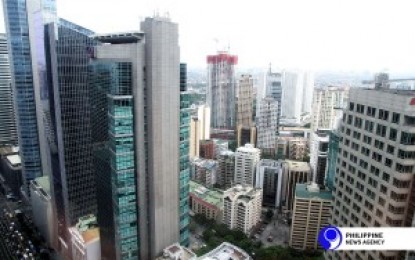
MANILA – The Philippines’ financial and capital market, despite being smaller compared to some counterparts in Asia, has a bright future thanks in part to government's continued push for its development.
Earlier, Pru Life UK President and Chief Executive Officer Antonio de Rosas said opinions about the “too shallow” equities and bond markets of the Philippines are backed by facts.
He said the domestic capital market “does not really offer enough diversity in terms of managing the risks of clients”, thus, if big fund managers enter the domestic environment, they are immediately faced with limitations.
He said that a USD1 billion investment, while considered very substantial in the country, is but a drop in the bucket by global standards today.
He, however, remains optimistic since the domestic economy continues to post strong growth.
Listed companies have been raising record-high offerings in recent years and investors are hailing this, attributing it to improvement of the domestic economy and risk-taking attitude of domestic investors.
Relatively, Bangko Sentral ng Pilipinas (BSP) Deputy Governor Chuchi Fonacier told the Philippine News Agency (PNA) that assessing diversity depends “on whether we are referring to institutional or individual/retail investors.”
She explained that “on the institutional side, there are efforts from the government in trying to develop the capital market” and “on the retail side, it's a matter of creating awareness as to the different investment options that are available to individual investors.”
“This is also where financial education programs can be of value and where partnerships between the public (government agencies) and private sector can play an important role,” she pointed out.
Asked when she thinks the country’s domestic market will be at par with its counterparts in the region, Fonacier said this “would depend on how effective the roadmap will be implemented.”
She said the government is committed to achieving developments in the capital market.
She added that Finance Secretary Carlos G. Dominguez III even heads the Capital Market Development Council (CMDC), which is tasked to “push for the capital market development framework.”
Also, Dominguez said the CMDC, which is co-chaired by the Financial Executives Institute of the Philippines (FINEX), along with other regulatory agencies and market participants have agreed to pursue short-term and medium-term measures within a four-year term ending in 2022.
He said these measures are targeted to “foster depth and liquidity in the Philippine capital to support the financing of growth-enhancing and job creating projects of both private and public sectors.”
He noted that Package 4 of the Duterte administration’s Comprehensive Tax Reform Program (CTRP) supports the capital market development.
This particular tax reform package is aimed at redesigning “taxation on financial sector intermediation into fairer, simpler and more efficient system,” he said.
Finance officials have said that there are about 80 types of taxes for financial investments and deposits, among others, in the country and Package 4 of the CTRP is targeted to simplify the taxes and cut these to just around 40.
Dominguez said strategic reforms identified in the blueprint for capital market development include the formulation of “new products and services to promote diversification in the debt and equity capital markets, support of market-making activities to increase liquidity in the secondary market, enhanced financial market infrastructures to achieve more reliable price discovery process, implement further improvements in regulatory approaches to protect investor interests and integration of technological innovations with current systems and processes to improve market accessibility.”
Innovations on the over-all enhancements of market liquidity, stable government security prices and increased bank and corporate issuances are continuously being achieved with the help of the BSP, Securities and Exchange Commission (SEC), the Department of Finance (DOF) and the Bureau of the Treasury (BTr), he said.
“The launch of BTr’s Retail Treasury Bond online ordering platform promotes financial inclusion and taps unserved segment of society as it opened direct participation of retail customers including Overseas Filipinos,” he added.
He is referring to the online platform that BTr used when it offered retail treasury bond (RTB) in February this year.
The online platform allowed account holders of state-owned Land Bank of the Philippines (Landbank) and Development Bank of the Philippines (DBP) to directly place RTB orders to the BTr instead of coursing it through their banks just like in the practice in the past.
The impact of these improvements is now being experienced.
Bank of the Philippine Island (BPI) President and Chief Executive Officer (CEO) Cezar P. Consing noted that although the domestic capital market is still relatively small “it’s deeper now than it was three or four years ago.”
He said size and volume of the deals that are being offered now “are getting quite bigger and bigger.”
He, however, admitted that “when you add it and look at it as the size of GDP (gross domestic product) and you compare to other countries in the region it is still quite small.”
“But again, we will get to the point when we are comparable,” he stressed.
Asked when this could possibly happen, the BPI chief said: “I think in a few years.”
He explained that “the thing that excites me is in the last couple of years investment as a percentage of GDP in the Philippines is beginning to approximate the ASEAN average.”
He said investments in the past “have always been lower” because domestic growth is led by consumption.
“Now with investments beginning to approximate the ASEAN average the quality of growth is a lot better. So that is what excites me,” he said.
“I think it is just a function of time before our metric will begin to look like the other countries,” he added. (PNA)
